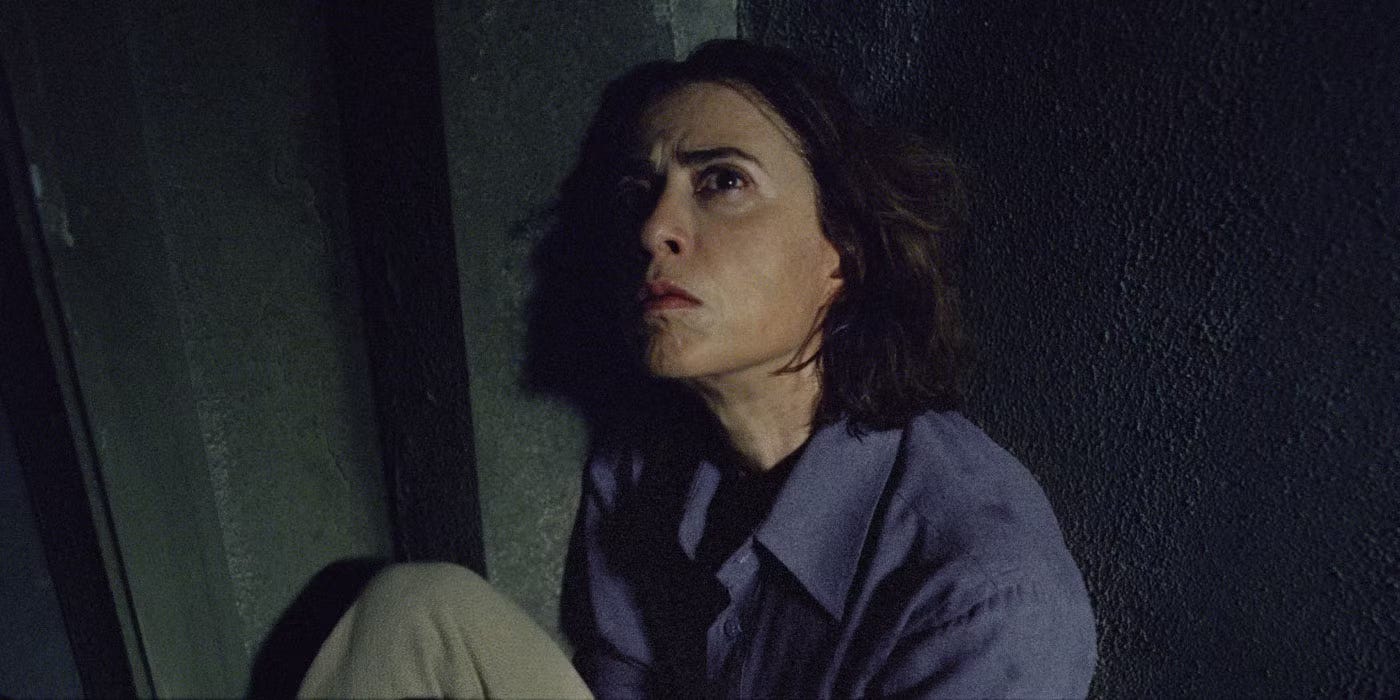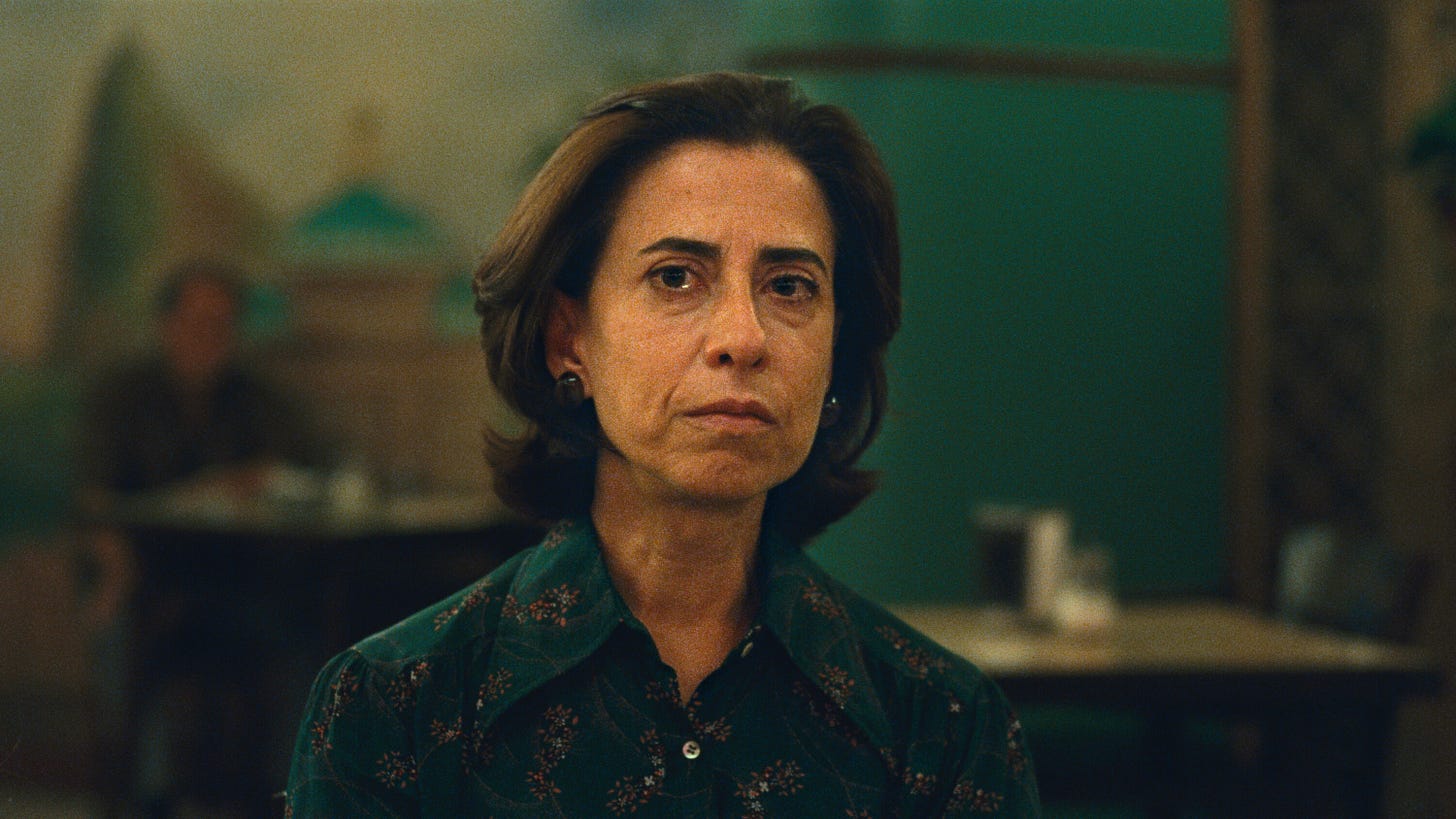What a shocker! Not many people had I’m Still Here making it into the Best Picture Top 10 earlier this year, but here we are. Crazier things have happened (Luka is a Laker). In honor of this achievement, Walter Salles’ new film has been released in theaters nationwide. Set during Brazil's military dictatorship, the story chronicles the real-life disappearance of former congressman Rubens Paiva, who’s falsely accused of subversion and forcibly disappeared by the regime. Eunice Paiva, portrayed by powerhouse actress Fernanda Torres, battles to uncover the truth behind her husband Ruben's disappearance while shielding their children from the harsh reality. Salles famous for The Motorcycle Diaries has returned to filmmaking after over a decade-long absence to chronicle an especially dark period in Brazil’s history. So, is I’m Still Here the searing political drama for our divided times? Or is it just another "based on a true story" film that makes a splash at the Oscars, and then fizzles out?
What’s it all about?
Opening on an idyllic beach, Eunice Paiva (Fernanda Torres) swims peacefully in the clear water until military helicopters suddenly soar overhead, shattering her serenity. This haunting contrast sets the tone for I'm Still Here, an engrossing political film set during Brazil’s military dictatorship. Eunice and her husband, former congressman Rubens Paiva (Selton Mello), have built a quiet life with their children in Rio de Janeiro after years of political unrest. But when a sudden military raid devastates their home, Rubens is forcibly taken without explanation, leaving Eunice to navigate a web of fear, silence, and uncertainty. As she fights to uncover the truth, she is met with resistance at every turn—risking her safety, her family, and even her freedom. Struggling to come to terms with the reality that her husband is gone for good—and faced with the unbearable task of explaining it to her children—Eunice must walk a line no mother should ever have to. Yet, through it all, she and her family resist the regime with quiet defiance, channeling their pain into a lifelong pursuit of justice against the brutal military dictatorship in Brazil.
A Family Portrait
For those expecting a cynical, hard-nosed political thriller out of I’m Still Here, you will be disappointed. Instead, Salles flips the script, choosing to celebrate resilience in the face of tyranny. This sentiment of greeting the enemy with a smile, knowing damn well that “our time will come” is a spiriting choice for our difficult times. The film, however, does not sugarcoat the political strife of the era, holding an underbelly of rage against injustice. Salles reflects an uncompromising picture of Brazil’s past through the Paiva family's quest for truth. The family structure is central to I’m Still Here, with the Paivas finding strength in unity. Everybody has been raving about Torres for good reason. She approaches the role with immense emotional delicacy, finding the correct gestures and facial expressions to subtly convey her unimaginable position. It would be easy to overdo a role of this nature, playing up the grief to the nth degree, but Torres understands the role to a tee. We see the toll it takes for her to hold back her anxieties and anger for the sake of her family. Her understated performance may appear seamless, but conveying strength and stoicism while crumbling inside requires an inordinate amount of precision. So when moments of pain and abject fear seep through, they transform into something all the more affecting. But, Torres’s Eunice doesn’t take the hits lying down, finding the inner strength and determination to stand up. What about the rest of the family? While not every other characterization is afforded the same depth as nearly every frame is spent with Torres, there’s enough to grow emotionally attached to everyone. Salles avoids rushing the family dynamics and initial harmony so that when it’s abruptly taken away, both the audience and the characters feel the massive void. It’s a masterclass in character building.
An Assured Hand
Walter Salles’s style strikes the perfect balance, being neither distracting nor uninspiring. He wholly wraps the audience into this family’s world, through the ups and downs with a big-hearted pull. There’s a universal yet undeniable strength to the picture that’s not adorned with an extravagant style, placing character and mood over vague abstractions. This classicist approach is far more compelling than if Salles had dwelled on excessive plot or political preaching (although I can’t imagine government torture ever becoming too preachy). Salles and cinematographer Adrian Teijido craft frames with meticulous detail, involving the audience seamlessly as the film’s mood shifts beautifully: from sun-drenched innocence to abject isolation and terror. This philosophy carries over into every scene, knowing when to express the serenity of the family’s home life or the constant tension of living under a dictatorship. One of the highlights in I’m Still Here comes when Eunice is interrogated by the regime shortly after Ruebens’ disappearance. Largely contained in the family’s home life, the scene is one of the few times the audience actively sees the government’s oppression at work. Otherwise, the tyranny remains largely implied throughout. Salles is unafraid to ramp up the anxiety, reaching into his horror treasure chest to invite the audience into what an uncompromising interrogation looks like where no matter what you say, you’re guilty. It’s the kind of terror that’s shrouded in a cloud of mystery. There’s one shot for instance where the guards mop the floors of the jail hallway with excessive soap that relays far more than a traditional torture scene. So, these instances of horror, for an otherwise human drama, provided a damning portrait of Brazil’s history.
Stuck in Time
The film’s aesthetic places it alongside other political films of that era especially from the likes of filmmakers like Resnais or Garvras in terms of capturing a specific moment. Some of the period accuracy can be on the nose–like the countless Godard and Guevara posters floating in the Paiva household, along with familial references to Blow-Up. However, it’s this sense of being stuck in time that holds I’m Still Here back from achieving artistic permanence. Based on the memoir by Eunice Paiva’s son Marcello written in 2014, the film is forced to stay within the confines of the true story. It reminded me of recently acclaimed, international 'based on a true story' films like Argentina, 1985, and Society of the Snow, which chart significant historical moments but are limited in scope. While the film's heartfelt focus on community and family is endearing, it handicaps its ability to experiment with form and truth like those 60s filmmakers the film references once did. However, I can’t fault the filmmakers here, as this novel—and I’m sure the project—wasn’t conceived as a topical rebuke of our socio-political trends. This was a novel written to personally account for an incident over 50 years prior. So, the film has to stay true to those emotions and that particular story with very little wiggle room to experiment. Everything else is frosting. This isn’t to say the filmmakers are afraid to be topical or hide behind the truth because the spirit of the film is certainly a brave one.
Why now?
The question that remains unresolved in my head is: why now? Why make this film now? While I mentioned that films come to fruition at different times and can't always address the zeitgeist, it's still a question I’m Still Here could have addressed with a grander artistic vision. Perhaps though, it may be a matter of perspective. Viewers could view the Paiva family’s fight for justice as emblematic of the approach we as a collective must take to fight oppression, especially as right-wing factions slowly take over the world. In that, the film finds relevancy that surely strikes a chord, one that I wish the film had more fully explored.
Regardless, I’m Still Here is one of the year’s best films. It’s a gripping, profoundly touching film with a deep well of pathos. The writing is honest, never talking down to its audience always keeping them on the level. In the United States right now where we’re seeing mass deportations and no-questions-asked type leadership, this global history and sense of preserving identity in the face of insurmountable odds is more than relevant. While the film’s “true story” inhibits some artistic leaps Salles could have taken, its thematic relevance is far too prescient. It reminds us that we can't move forward without looking back through the rear window and confronting the past.









